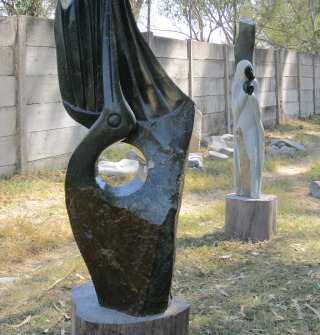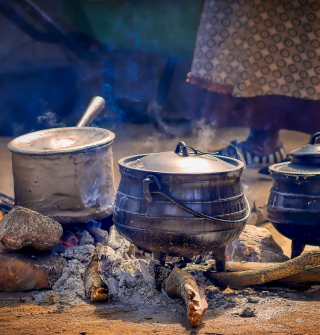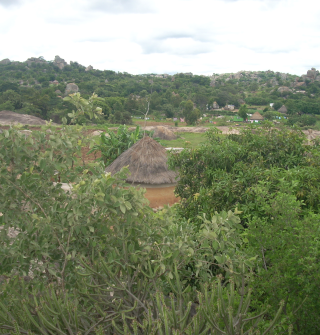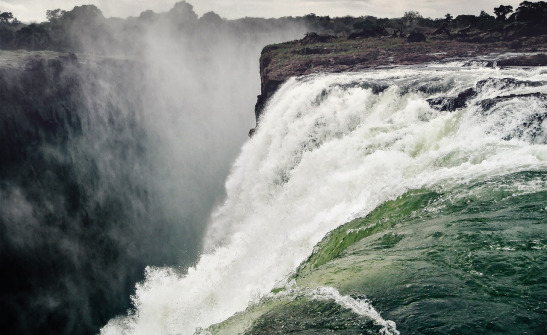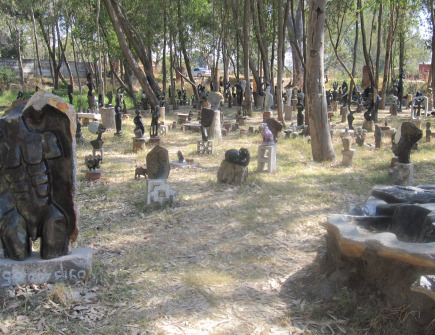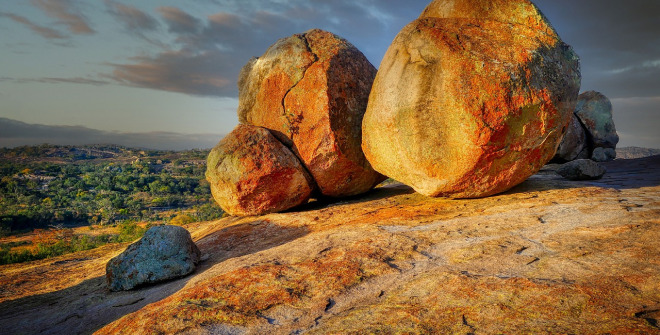Zimbabwe Tour
1.990 Euros
Description
With this experiential tour, we will introduce you to the knowledge about Zimbabwe’s history, culture, and society that you need in order to gain a nuanced understanding of the country.
This tour will take you beyond the common narrative. It will create the local experience that is necessary to reflect beyond the most obvious. We will unpack the connection (and disconnection) between the roots of traditional Zimbabwean life in rural areas and landmarks of historic and current significance.
Connecting to Zimbabwe
This tour is strongly based on conveying knowledge on cultural, historic and current affairs of Zimbabwe and connecting these narratives with places of significance that we will visit.
We are suggesting a 20-day program. The tour can be shortened or extended upon your preferences. During the first week of our suggested itinery, we will be in the capital city, Harare, where we will delve into different urban settings of living, discuss their colonial roots and explore landmarks that define the history and the current identity of the country; those include the National Heroes Acre, the African Liberation Museum (if construction is concluded), the Mbuya Nhanda Statue, the Domboshava Rock paintings, to mention just a few. Exploring the traditional meaning of natural wonders will allow us to appreciate places such as Domboramwari and the Balancing Rocks beyond their natural beauty. In order to understand the everyday-lives of the less fortunate urban population and the tireless efforts community-led organisations are doing to improve their wellbeing, we will engage with one of these organisations that works in the high-density suburb of Mbare.
We will then travel to the city of Masvingo, where we will learn from either a public official or a lecturer from Great Zimbabwe University about Masvingo’s history and present status. A highlight of our tour will be the visit to the ruins of Great Zimbabwe not far from Masvingo. It is here that we will appreciate the history of the ancient Great Zimbabwe that reaches back to the African Iron Age.
From here we will leave the urban settings and travel to the village Muchibwa – the birthplace of Prof. Obvious Vengeyi who will be accompanying our tour. For the next 2,5 days we will immerse ourselves in rural life, visit local schools, take part in every-day activities of villagers, and learn about their traditions.
We will leave the rural tranquility to travel to the city of Bulawayo, where we will just have a night-over before continuing to Victoria Falls the next morning. Our first day in the town Victoria Falls will be fully dedicated to visiting the magnificent falls. We will close up the day with a traditional Braai (BBQ) dinner. After another day in Victoria Falls town and visiting a cultural village, we will return to Bulawayo.
Bulawayo is the second largest city of the country and the largest city in the country’s Matabeleland region. A talk by the renowned cultural historian and author, Pathisa Nyathi, will prepare us for an informative tour of Old Bulawayo and its significance for the complex relationship between British fortune seekers, miners, and missionaries in the colonisation of Zimbabwe. We will also take the opportunity to visit the Matobo Hills, not far from Bulawayo, that consist of an impressive ancient, rocky landscape with a unique natural and social heritage.
Upon returning to Harare, we will take some time to relax. On our last day in Zimbabwe, we will have the optional opportunity to listen to a talk on business or investment opportunities in the country, evaluate the tour and reflect together on our impressions.
Tour schedule suggestion
Upon arrival at the Robert Gabriel Mugabe International Airport in Harare, you will be picked up and taken to the hotel. To feel the general atmosphere of the ordinary life in Harare, you could be driven past Rufaro stadium in Mbare. Mbare is the oldest suburb in Harare established by colonialists. It is one of the poorest and most overcrowded areas in Harare. A drive past allows you to start a conversation about Zimbabwe’s colonial history, present and future. Questions about race relations, class and livelihoods become central.
After checking in, you are free to rest and have an early night
After breakfast, we will be introduced to the program by our guides. Then our bus will take us to the National Museum in Harare. We shall be guided through the museum by the curator. In this museum, the expanse history of Zimbabwe from pre-colonial through the intervening colonial period until the post-colonial era will be the focus. Various aspects of Zimbabwean politics, religion and culture will be addressed. One important artifact housed there is the Ngoma Lungundu, a wooden object believed to be more than 700 years old and thought to be the oldest in sub-Saharan Africa. This object is believed to be associated with the Jewish, a Zimbabwean Remba people, an ethnic group that claims to have Jewish ancestry.
We shall have lunch at a relaxed atmosphere at Gava Restaurant. The afternoon shall be free!
After breakfast at the hotel, we shall proceed by bus to the National Heroes Acre. It lies 8 km West of Harare. The national Heroes Acre is a shrine. There lie remains of heroes and heroines of the national liberation struggle that brought independence in 1980. Of late the shrine has accommodated individuals who have served the nation in other capacities, in the main it is populated by nationalist and combatants of the Second Chimurenga. There we will come face to face with the national liberation history of Zimbabwe. This will help us put into perspective Zimbabwe’s political, socio-cultural, and economic trajectory and even the foreign and domestic policies.
We shall have pre-packed lunch at the National Heroes Acre as we conclude the tour.
If the African Liberation Museum/City, that is still being built at the time of planning this tour, will be open to the public, after lunch, we shall proceed to it. It is only across the road from the National Heroes Acre. The museum is an attempt to articulate the story of African colonialism and how Africans assisted each other until all were free. It chronicles the many battles that Africans had to fight to liberate themselves, from the first independence in Ghana to South Africa in 1994. This again will make us appreciate the formation and function of African institutions such as African Union (AU), Southern Africa Development Community (SADC), and others. The African dream of a united Africa is always the driving force in the background. The museum is envisaged to assist present and future generations to connect with the painful past that ushered in the peace and prosperity we enjoy today.
If the museum is not open to the public, we shall proceed to Snake World and Lion Park. The Snake World and Lion Park has an interactive centre managed by Non-Governmental Organisations that teach about the ecosystem and the animal kingdom, especially the cat family. Apart from close to two dozen lions in the Lion Park, there other animals, such as warthogs, giraffe, wildebeest, zebras, etc.
We then close the day at the park and drive back to the hotel where we shall have dinner.
We shall endeavour to have an early breakfast to visit Mbare Market. We will find it lively with farmers delivering their produce (vegetables and fruits) to vendors. It gives us an opportunity to appreciate the conditions characterising daily living experiences of the less fortunate. It also affords an appreciation of the economic activities of the ordinary people in Zimbabwe. At Mbare Market, families visit to buy fresh farm produce at a cheaper and affordable price. We are also free to buy and contribute to the economic wellbeing of farmers.
Mid-morning, we shall come to the Central Business District (CBD). In the CBD we shall cross streets with names of liberation heroes and buildings named after them. Of critical importance is to locate the CBD in the history of segregation during colonialism. Black people were not allowed to enter certain stores in the CBD. A tour also allows us to appreciate how people in Harare live. We will witness the people going about with their lives.
We finish the CBD tour with a visit to the statue of Mbuya Nehanda, a famous Zimbabwean spirit medium who is a symbol of resistance against colonialism in the First Chimurenga of 1896. A statue of Mbuya Nehanda was erected in 2021. Here those interested in gender studies and the contribution of women to the struggle for independence of Africa have a case to study.
We shall have lunch in the CBD in a restaurant. After lunch we shall visit the Art Gallery.
We are free to stay at the hotel or visit a local Pentecostal Church, especially the famous ones that draw thousands of congregants each Sunday, or to drive around seeing various assemblies of so-called white garment churches decorating various open spaces in Harare as they worship.
After breakfast, we will prepare for the visit to Mbare, where we will engage with ‘I am Zimbabwe Trust’, a volunteer community-led organisation that is dedicated to education and care for the most vulnerable children and young adults. It is an example of local grassroots initiatives in dealing with situations of vulnerability. Mbare is one of the poorest communities where some families can hardly afford a meal per day, let alone to send children to school or hospital. Mbare derives significance not only from it being the first black township (most crowded and poorest) in Harare but also in that Zimbabwe’s independence in 1980 was celebrated there with Bob Marley performing.
Towards lunch we drive toward Epworth, Domboramwari. We may have lunch at Gapuramambo – a traditional restaurant along the way. After lunch we will reach Domboramwari and Balancing Rocks. A local guide shall take us through the tour. It is believed that in Domboramwari there is a giant footprint on the rock that is believed to be God’s. and tradition has it that God stepped on it when the rock was just being formed, when it was semi-solid. Individuals and groups frequent the rock in search of this giant footprint of God. Some church groups gather for services on the rock with hopes of connecting to God as they believe the rock to be sacred. Traditions have it that the footprint sometimes disappears, and no one can see it. But when you are lucky, you find it. Let us see who will find it!
Another important feature of nature around are the Balancing Rocks in Epworth. There are various rocks that are delicately balancing to the extent that one fears that anytime they may fall. Again, the rocks are ascribed sacrality.
We end our day in Epworth and drive back to the hotel.
In the late morning, we will drive to the Northern suburbs to have an appreciation of the lives of the well-to-do in Harare. We shall be able to compare and contrast what we saw in Mbare and Epworth with the living conditions of the more fortunate. The whole social class architecture of Zimbabwe will be in question. Their roads and houses are very different from the rest of the population. We shall be able to tour the Semy Levy Shopping Complex. This is where the well-off buy and spend their money. This tour affords us another perspective of Zimbabwe. It is not only about poverty, but it also has the rich few.
After lunch we may proceed to Domboshava Rock Paintings, less than 10 km to the north of Semy Levy Complex. Here we delve into prehistoric times, a time when the Khoi-San pejoratively known as ‘Bushmen’ were the owners of the land. At a cave, there are paintings by them. The rock provides a wonderful scenery for picnic.
The day ends at Domboshava rocks and we return to the hotel.
We will start off very early so that we avoid traffic congestion in Harare. The intention is to have breakfast at Chivhu (a small city along the way). Chivhu was established by Dutch settlers who named it Enkeldoorn in 1891.
Depending on the time we get to Chivhu and finish breakfast, we may proceed to Abel Mauchi monuments. Abel Mauchi is a well-known Zimbabwean poet who of late has constructed a monument that is a replica of Great Zimbabwe. With that monument he wishes to attract local and international visitors to his village. If we manage to visit Mauchi homestead, we will be able to have a tour of the monument and conversation with him. This will give us an opportunity to witness for ourselves an example of some local initiatives at attracting visitors.
After lunch, we should proceed to Masvingo.
If we do not go to Mauchi Monuments, we will reach Masvingo and check into the hotel in the early afternoon.
After dinner we will have a talk about Masvingo (history, present status and future), from either a public official or a lecturer from Great Zimbabwe University.
After the talk we retire to bed.
After breakfast at the hotel, the bus takes us to the famous Great Zimbabwe Ruins, where a guide shall take us on a tour. We will start with the museum and proceed up the hill complex and descend to the valley complex. Great Zimbabwe’s historic significance is not only in the fact that it is a symbol of the residue of the ancient empire but also because the name of the country Zimbabwe is derived from it. Various aspects of ancient lives will be under study.
We shall have lunch at Great Zimbabwe hotel before proceeding to Muchibwa Village, about 85 km south of the Great Zimbabwe Ruins. Along the way, Prof. Obvious Vengeyi, who will accompany the tour and was born and grew up in this village shall explore various topics that should assist visitors to understand village life. There will also be time for us to view nature and human activities that characterise rural life.
After arrival in the village, we will have dinner and retire to bed. There is also a possibility to participate in some activities that are common in villages or to sit and plan for the next day.
Accommodation in the village is in shared bedrooms. There is a possibility for some to sleep in a grass thatched hut.
In the villages people do not have cars and buses to take them around for daily schedules. They walk. and usually bare-footed. Children walk distances of up to 4 km or more to kindergarten and to primary schools. After seven years of walking such distances daily they graduate to a secondary school. A secondary school is even further for many. In the case of Tugwane Secondary School, it is about 11 km from Muchibwa.
After breakfast, we shall attempt a walk to Muchibwa Primary School; bare footed would be ideal. But you are encouraged to carry your flat/ walking shoes in case you would like to put them on. Let us just try to be one with them.
From the Primary School, we will discuss how we will proceed to the Secondary School. A walk along the gravel road would be a fantastic experience. However, those who cannot bear the distance on foot have the option of the bus.
We shall have our pre-packed lunch at the secondary school. And we will have an opportunity to talk to teachers and administrators of the school and students about their various challenges, innovative ways of going about life and aspirations etc.
Ideally, we could walk back to the village talking to secondary school children. We shall have dinner in the village.
On this day, we will experience rural or village life with villagers. We seek to participate in their daily experiences and activities to appreciate their real-life conditions. It would be interesting to take part in fetching water from the nearby river or stream or borehole. We may also fetch firewood, participate in ploughing and weeding, herding cattle etc. On this day, it would be important to suspend our usual timetables for breakfast and lunch and try as much as possible to be one with the community.
The day must be open to village programmes that may arise. In the afternoon, we will take a bus to Renco Mine.
Renco Mine is famous for gold production in Zimbabwe. It is just less than 10 km from the village. Renco Mine used to be run by an Anglo-American company and was the best gold producer in the country. Renco Mine is the nearest sort of urban community surrounded by villages. Villagers walk to Renco Mine every day to work, look for employment, to sell vegetables, fruits and other things. Questions to do with environmental damage and mining, human rights and social justice shall be topical.
We conclude the day with a traditional dinner in the village.
We plan to leave the village early to go to Bulawayo. We pass through Masvingo town, where we will have breakfast. We shall be in Bulawayo for lunch at the hotel. After lunch, the day is free: we relax at the hotel and rest.
After dinner, we should be able to sleep early to prepare for the next day’s journey to Victoria Falls.
Early in the morning, we will start off to Victoria Falls. We shall have pre-packed breakfast along the way. After lunch we will visit the Victoria Falls which is known by the locals as Mosi-oa-Tunya (the smoke that thunders). It is one of the seven natural wonders of the world and the largest sheet of falling water. David Livingstone, a British missionary and explorer was the first foreigner to visit it. He later claimed to have discovered it hence he named it after Queen Victoria. The locals, the Tonga people of both Zambia and Zimbabwe regard it as sacred. It is famous for international visitors.
After our visit to the Falls, we will prepare together a traditional Braai (BBQ) – dinner at a scenic location where we will unwind and enjoy the evening.
After breakfast we shall visit a Cultural Village near Victoria Falls to appreciate the local culture. We will be introduced to traditional practices of the region and will have lunch at the Cultural Village.
After lunch, the day will be free. We are free to go back to the Falls, stroll around Victoria Falls town, explore local crafts markets, or rest in the hotel.
We will attempt to attend a local place of entertainment in the evening to appreciate local music and entertainment culture.
Early in the morning, we will start off to Bulawayo. We shall have pre-packed breakfast along the way. Upon checking in at a Bulawayo hotel, we shall have lunch. The afternoon shall be free.
After dinner, we shall have a talk from a renowned cultural historian, author, and founder of the Amagugu International Heritage Centre in Bulawayo, Pathisa Nyathi. The talk shall prepare us for the next day at Old Bulawayo.
After breakfast in the hotel, we shall visit Old Bulawayo, the ancient city that was established by King Lobengula around 1870. It is at this site, that has now been reconstructed that we will learn about the complex relationship between British fortune seekers, miners, and missionaries in the colonisation of Zimbabwe.
We shall have lunch at a local restaurant, a bit out of the city. After lunch we shall have a city tour, whereby the statue of ‘Father Zimbabwe’ the late former Vice President of Zimbabwe, Joshua Nkomo, shall be the first port of call. Various places in the city shall be visited. We shall be led by a local guide.
We will have dinner in the hotel.
After breakfast in the hotel, we shall head southward to Matobo Hills. The Matobo Hills consist of an ancient, rocky landscape with a unique natural and social heritage. One of the highest concentrations of prehistoric rock paintings in Southern Africa can be found here, while the hills are still a focus for local community shrines and sacred places. It is the home of the regional oracular cult of the High God, Mwari (ChiShona) or Mlimo (isiNdebele), whose voice is said to be heard from the rocks.
The Matobo Hills have been part of multiple of the important historical events that have shaped Zimbabwe. There are battle sites, graves, ruins, and relics that date back thousands of years through to recent events. One of them is the grave of Cecil John Rhodes, a British man who colonised Zimbabwe and named it after himself. Before independence, Zimbabwe used to be called Southern Rhodesia. Zambia was Northern Rhodesia. Rhodes had a dream to conquer the whole of Africa, from Cape to Cairo.
We shall have lunch in the bush and will drive back to the hotel afterwards.
Early in the morning we start our trip back to Harare. On the way, we will have breakfast in Gweru, from where we will proceed to Harare via Kwekwe, Kadoma, and Chegutu, small towns along the way. We will have lunch at the hotel in Harare.
The afternoon shall be free.
After breakfast, we shall have an optional opportunity to listen to a talk on business or investment opportunities in Zimbabwe from either an official from the Ministry of Industry and Commerce or from an organization on Investment.
After the event, the whole afternoon shall be free.
After dinner we will evaluate and review the tour and make recommendations.
You will be taken to Robert Mugabe International Airport in Harare for departure.
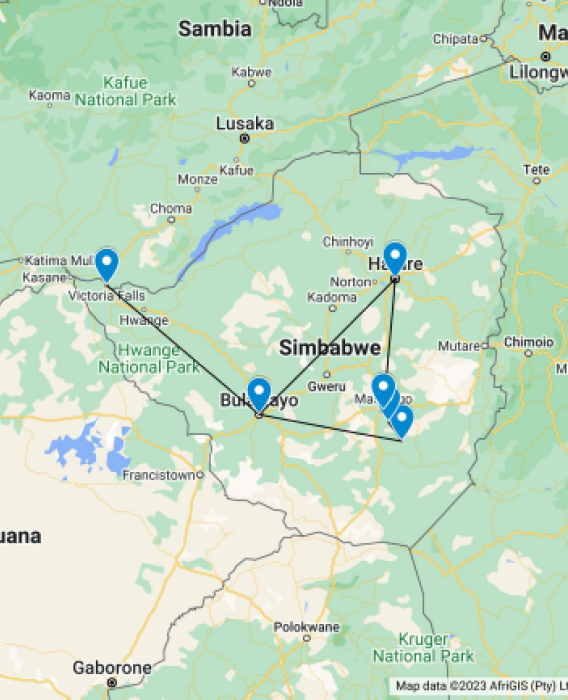
Enquire Now
Send us a message for individual or group requests by using the form below.
Services
Included services
- Transfer from and to Robert Mugabe International Airport, Harare
- 16 nights in lodges (double occupancy) in Harare, Masvingo and Bulawayo and 3 nights in shared rooms in village setting
- Breakfast, lunch and dinner for 20 days
- Drinking water during the whole tour (we recommend you to bring a reusable drinking bottle)
- Local tour guides throughout the whole tour (language: English)
- Transportation throughout the whole tour by private and local buses
- Entrance fees and guided tours according to the program
Excluded services/additional costs
- Flight to and from home country
- Travel Insurance
- Visa costs *1
- Single room (additional costs for 16 nights: 377 Euro)
- Alcoholic drinks
- Tips
- Personal health certificates and prophylaxis
- Expenditures for activities that are not part of the organized program*1. Confirm entry conditions with the Zimbabwean Embassy of your country. A single-entry visa to Zimbabwe currently costs 30 USD for German citizens and is issued at the port of arrival (airport or land border). The Zimbabwean Embassy in Germany publishes information on visas here: https://www.zimembassyberlin.com/consular-services/visas/
Optional extension/addition
- Arrangements of stay of extended days
- Family stays during extended days

